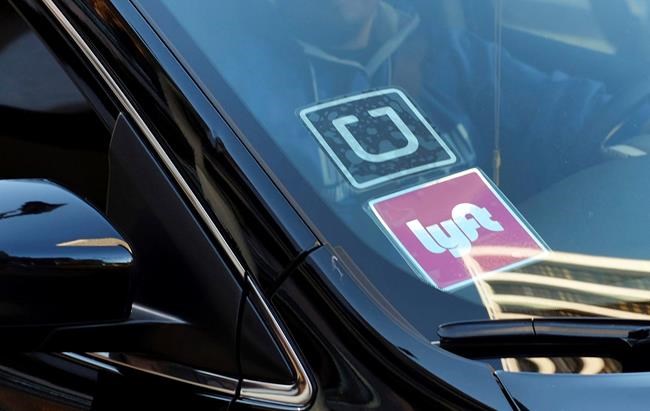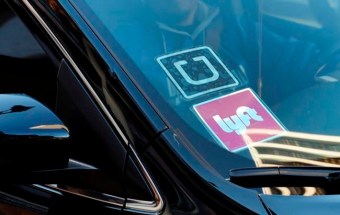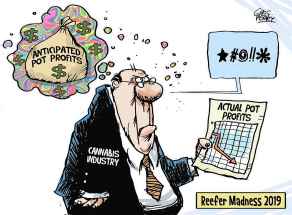Supreme Court case won’t derail gig economy
Read this article for free:
or
Already have an account? Log in here »
To continue reading, please subscribe:
Monthly Digital Subscription
$0 for the first 4 weeks*
- Enjoy unlimited reading on winnipegfreepress.com
- Read the E-Edition, our digital replica newspaper
- Access News Break, our award-winning app
- Play interactive puzzles
*No charge for 4 weeks then price increases to the regular rate of $19.00 plus GST every four weeks. Offer available to new and qualified returning subscribers only. Cancel any time.
Monthly Digital Subscription
$4.75/week*
- Enjoy unlimited reading on winnipegfreepress.com
- Read the E-Edition, our digital replica newspaper
- Access News Break, our award-winning app
- Play interactive puzzles
*Billed as $19 plus GST every four weeks. Cancel any time.
To continue reading, please subscribe:
Add Free Press access to your Brandon Sun subscription for only an additional
$1 for the first 4 weeks*
*Your next subscription payment will increase by $1.00 and you will be charged $16.99 plus GST for four weeks. After four weeks, your payment will increase to $23.99 plus GST every four weeks.
Read unlimited articles for free today:
or
Already have an account? Log in here »
Hey there, time traveller!
This article was published 20/11/2019 (2212 days ago), so information in it may no longer be current.
‘Supreme Court set to hear Uber case with implications for gig economy.”
This headline topped a recent news story about the ride-hailing app’s challenge to an Ontario Court of Appeal decision that found the company’s contractual clause disallowing class-action lawsuits both invalid and unconscionable.
If the Supreme Court of Canada rules against Uber, it will allow the class action (instigated by a delivery driver for UberEats) to go forward, moving the company one step closer to being forced to admit its Canadian drivers are not independent contractors and are therefore entitled to minimum wage and other protections under the Employment Standards Act.

The case has local implications, as a proposed class-action lawsuit filed in Manitoba’s Court of Queen’s Bench by a former Skip the Dishes delivery driver has effectively been put on hold until the Supreme Court case is adjudicated.
But contrary to the headlines, it’s going to take more than a Supreme Court ruling on Uber’s arbitration processes, or even a successful class action, to make a meaningful impact on the gig economy, which has been on the rise since the 2008 financial crisis, and isn’t merely reserved to ride-hailing or delivery drivers, but includes all manner of piecemeal freelance work that won’t be affected by the Uber ruling.
Though court challenges have forced Uber in the United Kingdom to pay minimum wage, sick time and maternity benefits to drivers who have put in a certain number of hours, those who use their Uber gig the way the company claims most people do — as a side hustle to supplement another poorly paid job — are not eligible for those benefits.
The gig economy is getting bigger every day: Canada’s is nothing compared to that of the U.S., where almost every task you can imagine and every kind of delivery, from groceries and takeout to prescriptions and booze, can be outsourced to someone willing to work for peanuts.
In London, which has 45,000 Uber drivers, the average hourly wage for a driver, after expenses and taxes, is about £11 (C$18.90), which is 80 p (C$1.37) over London Living Wage. Those drivers are on the road 30 hours a week — hardly what could reasonably be described as a “gig.”
But as long as established employers and big corporations continue to replace full-time positions with part-time and contract workers without access to benefits, there will be people who need to supplement their income by accepting side jobs, no matter what the conditions. For those desperate to make ends meet, the siren song of “flexible hours” or “working from home” will necessarily prove more appealing than the ever-dwindling possibility of a job that offers security and a pension.
Corporations aren’t solely to blame. As long as we demand to be able to sit in our living rooms while everything from Thai food to toilet paper is delivered to us at the click of a button, tech companies will continue to develop apps to connect us with people willing to fulfil our demands.
The gig economy is getting bigger every day: Canada’s is nothing compared to that of the U.S., where almost every task you can imagine — assembling IKEA furniture, walking the dog, picking up dry cleaning — and every kind of delivery, from groceries and takeout to prescriptions and booze, can be outsourced to someone willing to work for peanuts.
Minimum wage is literally the least workers can ask for — but instead of wrangling with tech companies over employment terms, consideration should be given to raising it to $15, a level viewed by anti-poverty activists as closer to a living wage. Manitoba’s minimum wage, among the lowest in the country, recently increased 30 cents to $11.65 per hour..
It would be a step toward curtailing the gig economy that continues to take us all for a ride.










